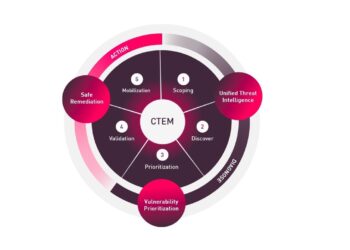Security automation can be defined as using technology to detect, analyze and remediate security threats programmatically with reduced human involvement. Automation not only transforms the operations, customer service, communications etc, it is also being used to detect and investigate incoming cybersecurity threats. It helps companies identify incoming threats and take appropriate action based on prioritized alerts, it can filter false alerts from real threats and notify the system administrator only for critical threats. On average, every enterprise gets 10,000 alerts every day.
Cybercriminals evolve the sophistication of their malicious attack methods, many attackers use powerful automation techniques to carry the cyberattack. Organizations use automation technology in many forms like business process automation (BPA), robotic process automation (RPA), and AI-based automation to enhance efficiency. Many organizations already use automation in security to strengthen their cyber defense system and help their DevOps and SecOps focus on strategic tasks rather than being busy looking into all system cybersecurity alerts.
Why security automation is important
In this digital environment, security automation is important for organizations as it strengthens the overall security system by automatically eliminating common security alerts so SecOps can focus on the actual schedule, not spend their time on every alert. Following are the major benefits of security automation.
1. Reduces SecOps and DevOps workload
To enhance the security system, sometimes developers face challenges that they do not understand. Manually, they may not understand the incoming security alerts because they are not security professionals.
Here security automation helps, it helps both the teams by automatically stopping the variance that can exist between these teams. It instructs both teams to understand priorities based on security alerts and drive the operation smoothly.
2. Operation efficiency
Security automation makes operations more efficient, it enables to prioritize actions from incoming threats and handle common cyber attacks automatedly with automatic set actions. Many such tasks security threats will run automatically with less human interference. it makes the system intelligent and quick to identify threats
3. Quick and real-time threat detection
Security automation analyzes the n-number of incoming risks and automatically tries to eliminate them with a set course of action. It detects threats faster and alerts SecOps in real-time without any manual effort. The system will detect cyber threats like malware, phishing attacks, etc, and send notifications to the security team in real-time.
4. Stops alert fatigue
Security alert fatigue is very dangerous in cybersecurity, it happens when the security team gets a massive number of security notifications, making it challenging for the security team to identify actual threats. It numbs the staff to cyber alerts. Security automation automatically eliminates common alerts and attacks and sends notifications of only critical errors.
5. Secure software installation
We frequently deploy software applications to make the process more effective. Security automation provides high-end security in the development process. It detects potential security threats that can be addressed and fixed during the process.
Closure
Accelerating the digital transformation journey will undoubtedly bring many benefits and invites unavoidable cyber security risks. Automation in the security process will strengthen the overall security system with less human interference.
Automation technologies help organizations strengthen defense systems and minimize the cybersecurity risk with less human inputs. With the help of technology, security automation programmatically performs security tasks to protect applications, critical data, and IT infrastructure with minimal human assistance.
Also Read: Cyberattacks against organizations increased by an average of 50% in 2021, compared to 2020


















